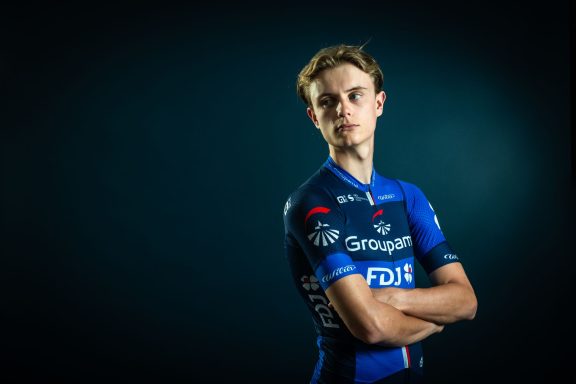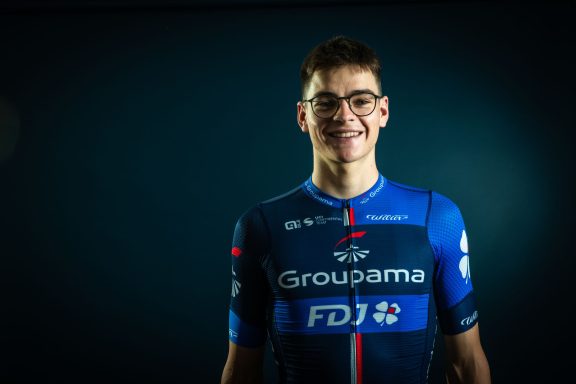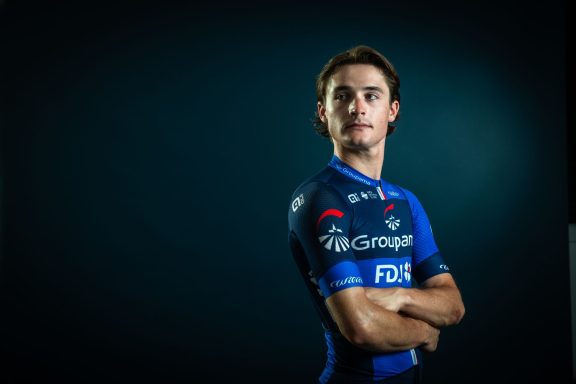After having worn the Groupama-FDJ’s colours as riders, several people are now working within the organization in various positions. Changing careers through the team may seem logical, but it is never insignificant. We met several of these former riders, starting with Benoît Vaugrenard, sports director within the WorldTour team but also co-responsible for the follow-up of the Juniors program.
Benoît, at what point in your career did you start thinking about your future?
Everyone has their own timing. Some rather wait until the last moment, others rather anticipate quite early. Personally, I was thinking about it for a while. With two-year contracts, you know that everything can end quite quickly. I had some ideas in mind, and then, as time went by, I sorted them out and so that it would lead to a more concrete plan. It matured a few years before my retirement. I also discussed it with my wife, to find out her opinion, to know if she would accept to see me leave again. I had to find what was best for me, but also for my family, as I have three children. I looked at all the options, in and out of cycling, and eventually, staying in the business was what suited me best.
“You realize that the post-career is as important as your career, if not more so”
Have you always felt concerned by this matter?
At the beginning, you’re a bit carefree. When you turn professional at 20, you don’t think about it at all. Then, as the years go by, through family and friends, you also see what’s going on outside of cycling. You realize that being a rider is certainly a hard job, but that you still have a fairly privileged life. You also realize that the post-career is not easy, and that it is just as important, if not more important, than your career. It’s longer, it’s different, you’re no longer spoiled, no longer in the limelight, no longer well-known. It’s a new life. When you are a rider, you are in your own bubble, but when you talk to former pros and sports directors, you realize that what comes next is not easy. As the years go by, you start to understand it and prepare yourself for it.
What did your career bring you, beyond the sporting aspect of things?
Some company managers have already told me that high-level athletes have a certain amount of courage. You have to train in the cold, all alone. Despite the benefits, there are many constraints such as sleep, food, or leaving home. There is also handling stress and pressure. These things help us for the future. It’s one pro we acquire. After having experienced big competitions, with that slight knot in your stomach, you manage more easily to deal with moments of tension in your post-career’s life. They say that cycling is a university of life, and it is true. Willpower, self-sacrifice, and courage are qualities that the cyclist can use in his future life.
In concrete terms, how did your conversion take place?
I retired in 2019, but I had already made my decision to stop during 2018. A year before, I was starting to really know what I wanted to do. I passed my state diploma in my last pro year, with the agreement of the team that allowed me to follow a training course. I was still a pro cyclist, but I had already put my foot down for a new career. My pro career was behind me, and what mattered was the future. When I took my diplomas, I didn’t know if the team was going to hire me. In any case, my plan really was to continue within the sport, even in amateur ranks. These diplomas could open a lot of doors for me. I could also work for a city. I knew that I wanted to stay in cycling, and once I had my diplomas, I had to see what opportunities were available.
“We try not to make it overwhelming for the juniors”
You eventually joined Groupama-FDJ, quite simply…
To be able to keep working with the team was a sign of trust. Marc had come to see me at the end of 2019 and told me that he was planning to restart the Juniors follow-up. He let me think about it but working with young riders definitely was something that interested me. I told him “yes”, and off we went, although the first year proved difficult because of the pandemic. In any case, it was all very natural. I was obviously interested in being a sports director, but I also wanted to see what was going on with the youngsters. I could see that something was happening with the new generations, with these riders who were maturing very early, who were winning big races very quickly. I was curious about that, I wanted to understand why and to see for myself.
This brings us to your current role. What is it?
I work with Joseph Berlin-Sémon, who is a coach at Conti, on the Juniors follow-up. First, there is a scouting stage. We follow the results, the competitions, we go to the major events. Then, we get closer to the parents and the clubs. We try to figure out what we can do with the young man, by asking him what he wants to do and how he sees things. There is a whole approach process. Then, you have to understand if the project interests both parties. If this is the case, we can work together for one or two years, during which we provide support in terms of equipment, camps, training or small courses on dietetics and communication for example. For those who we feel they have the potential, we can then offer them a place in the Conti team. This was the case for Lenny Martinez or Eddy Le Huitouze in 2022, or for Jens Verbrugghe and Colin Savioz this year. The aim is to gain time in the Conti: we already know them, we know their qualities, their faults, they know how the team works, they know Besançon, the equipment, the coaches. We also try not to make mistakes. If we feel that it doesn’t match, the rider is also free to join another team. We try to maximize our recruitments so as not to lose time. So far, it’s going pretty well. Lenny went from the Juniors to the Conti, and from the Conti to the WorldTour. He’s the first one to have gone through all the stages.
Do you need to be particularly attentive with the Juniors?
We try not to change their habits, because they are still young, at school and living with their parents. We try to keep things as simple as possible. If they want to benefit from our coaches, that’s no problem at all, but we don’t race as Groupama-FDJ. They have their own races with their team, or their national squad. It’s mainly about support. We phone them, we speak with their coach, their club president, we travel to competitions to see them, we meet them in training camps. We establish a relationship during the season. We see their evolution, we try to solve all their little problems, to help them improve, to answer all the questions they may have. We try not to make it overwhelming. We can’t do too much either, be purveyors of dreams or treat them like pros. We must be super vigilant. We follow them as juniors, but there is no “job offer”. We have to find the right balance, to help them, to support them, without making a big deal of it. They do have a real opportunity, but everything remains to be done, and that’s what we have to make them understand.
“I like this double role”
Although you are a former pro, did you need time to get used to this mission?
It wasn’t easy, that’s for sure. It’s been three years now and the program is starting to be very solid, we’re starting to get used to it and to understand a lot of things. Of course, it doesn’t happen overnight, and you make mistakes. I also benefited from the support of Joseph, who had some experience with young riders. It takes two or three years to get to grips with the topic, to understand how scouting works, to know what errors to avoid. You learn as you go along. It’s up to us to understand why some riders are more mature than others, why some break through at the age of 20, why others start performing at 23-25, and why we have so many Juniors who go directly to the WorldTour whereas it was unimaginable before. At the beginning, I didn’t have answers to all these questions. Now, I have more, even if it is still hard to predict the future and to know how a kid will evolve.
You are also a sports director with the WorldTour team. How do you reconcile the two roles?
It may seem complicated, but for now, I manage it well. The Juniors follow-up allows me to see something else and to avoid entering a routine. It’s a change. For example, we did a camp in Mayenne, and it was like going back to basics: we did the laundry, we cleaned the bikes, we did the shopping. I think it’s quite nice, and I like this double role. Even when I am a sports director with the WorldTour team, I like to take 10-15 minutes to look at the kids’ results. Every time, I look forward to Sunday evening to check all the results of our young guys. It allows me to disconnect a little from the professional pattern. It’s a breath of fresh air, and we shouldn’t forget our base. It also allows me to talk to club presidents, managers, volunteers, and to understand the issues they may encounter. We must not forget where we come from.



No comment